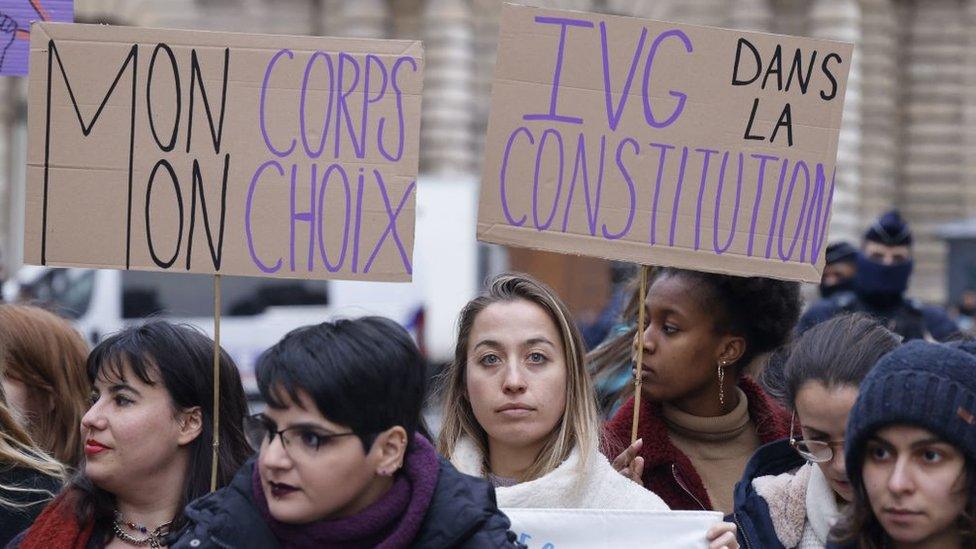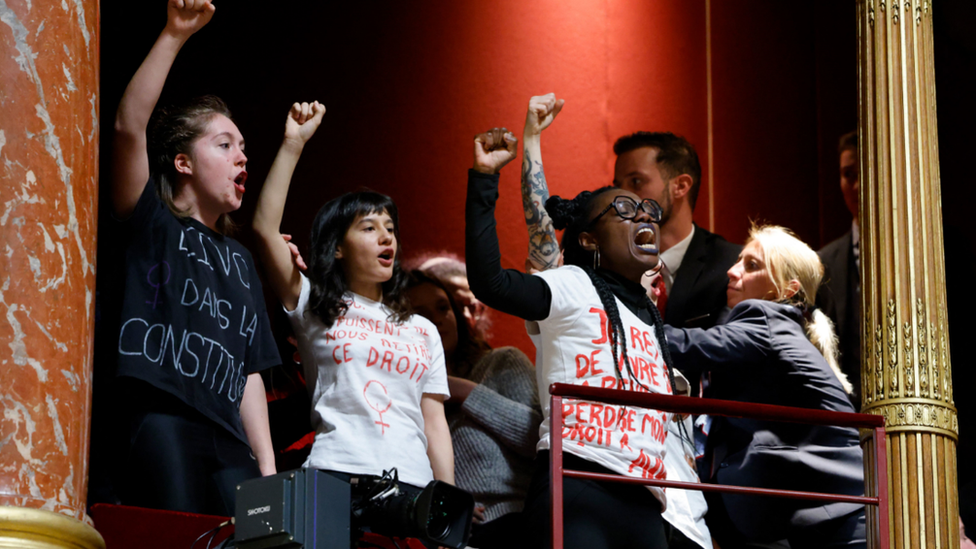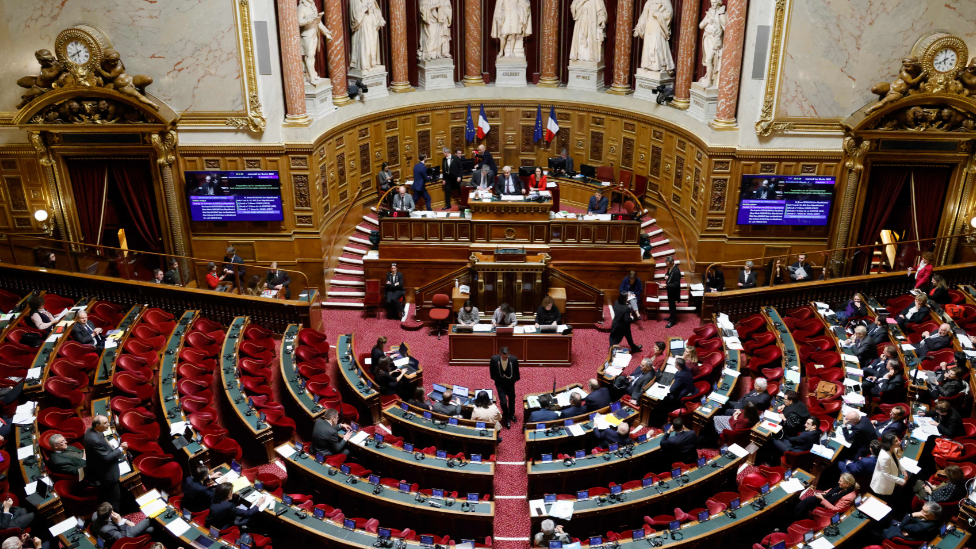Why Macron hopes abortion rights are a political winner
- Published

Protesters outside the Senate in February with placards reading "my body my choice" (L) and "abortion in the constitution"
France is preparing to become the first country in the world to put the right to abortion in its constitution.
On Monday, parliamentarians from the upper and lower chambers will meet in special session in the Palace of Versailles, summoned by President Emmanuel Macron.
If, as expected, they vote for the government's motion by a three-fifths majority, then the country's 1958 constitution will be revised to enshrine women's "guaranteed freedom" to abort.
It will be the 25th amendment to the Fifth Republic's founding document, and the first since 2008.
Spurred by the end of federal protection of abortion rights in the US two years ago, supporters are exuberant over the revision - which they see as insurance against any similar backpedalling in France.
Polls show around 85% of the French public support the reform. Resistance from right-wingers in parliament has failed to materialize.

On 1 February French protestors voiced their support for abortion rights from a balcony during a debate on a draft law on the constitutionalisation of the right to abortion at the Senate in Paris
Opposition, instead, has largely focused on the politics of the move: President Macron is accused of debasing the constitution for electoral ends.
Critics say the revision is not necessarily wrong in itself, but unnecessary - and they see a weakened president trying to use the cause to boost his left-wing credentials and to flush out opposition to abortion.
Political
President Macron lacks a majority in the National Assembly and faces an uphill task getting any reforms into law.
His January reshuffle of his government meanwhile slanted it to the right.
Following controversial laws last year on pension reform and immigration, this has given the jitters to left-leaning components of his Renaissance party - for whom the abortion revision is now a welcome re-balancing.
"It is a big relief to be able to proclaim our unity again on an issue over which the whole of the party can agree. There have been a lot of tensions inside Renaissance, but now we can remind ourselves of the values we share," said one left-wing member of the party who asked not to be identified.

The proposal, approved earlier by the lower house, the National Assembly, was backed by 267 votes to 50 on Wednesday
But, in taking up what had originally been a left-wing parliamentary initiative, Mr Macron was doing more than just shoring up his left-wing support. He was also setting a trap.
With European elections approaching in June, the president hoped the constitutional revision on abortion might open a clear fault line between his party and its main opponents, Marine Le Pen's far-right.
If enough parliamentarians from the right and far-right objected to the reform, then they could easily be cast as reactionaries.
Unfortunately for him, neither the Le Pen's National Rally (RN) nor the conservative Republicans (KLR) took the bait.
Given a free vote in Assembly and Senate debates which preceded Monday's special congress, most right-wing parliamentarians voted for the bill.
No parallel
Which is not to say many of them did not have misgivings about the constitutional reform. They just decided it was not worth fighting.
In fact the main argument against the revision has nothing to do with the matter of abortion. The argument is over whether abortion is a matter for the constitution.
In France, the right to abortion has been enshrined in law - not, as it was in the US, by a single supreme court ruling - since 1975.
Since then the law has been updated nine times - and on each occasion with the aim of extending access.
France's constitutional council - the body that decides on the constitutionality of laws - has never raised a query.

On 28 February, people held a banner which read "Abortion is a fundamental right" during a demonstration organised by the collective "Abortion Europe, women decide"
In a 2001 ruling, the council based its approval of abortion on the notion of liberty enshrined in the 1789 Declaration of the Rights of Man, which is technically part of the constitution.
So, according to many jurists, abortion is already a constitutional right.
"Beyond being a symbol," says Anne Levade, a law professor at Paris-Sorbonne University, "the revision will change absolutely nothing."
Misuse of constitution?
She and other experts worry the purpose of the constitution - to set out a sparse set of immutable rules inside which law and politics can function - risks being undermined if it becomes a repository for a succession of "rights".
What if in the future elected representatives become convinced having a child is also a right? Will surrogate motherhood be put in the constitution? Or what about gay marriage? Or the attainment of carbon reduction targets?
"There is a French particularity which leads politicians - in an almost Pavlovian way - to look for a constitutional change each time they want to signal the importance they attach to an issue," Levade laments.

French professor of public law Anne Levade is in favour of abortion
Supporters of the reform however say it must happen to guard against a new wave of "reactionary" social change in Europe that could bring to power those who are minded to restrict the right to abortion.
They point to countries like Malta, Hungary and Poland where limits are already in place or the subject of much debate.
"In women's rights, symbols count," feminist lawyer Rachel-Flore Pardo said of the constitutional change.
"Tomorrow they become our battlements. To wait until abortion was actually under threat would be to wait too long."
Related topics
- Published28 February 2024
